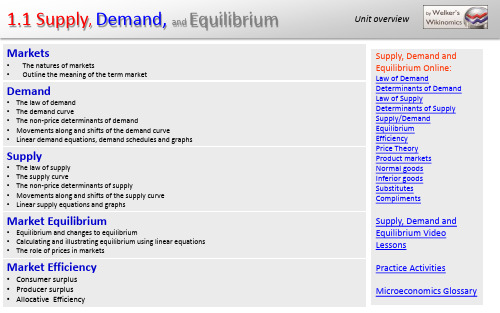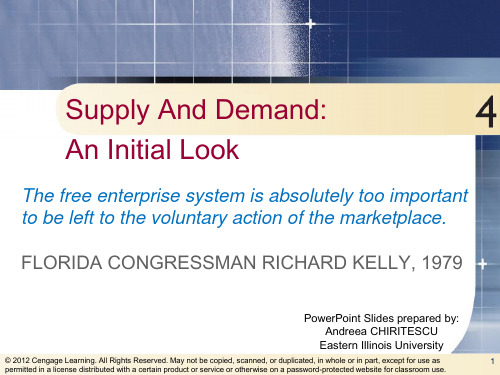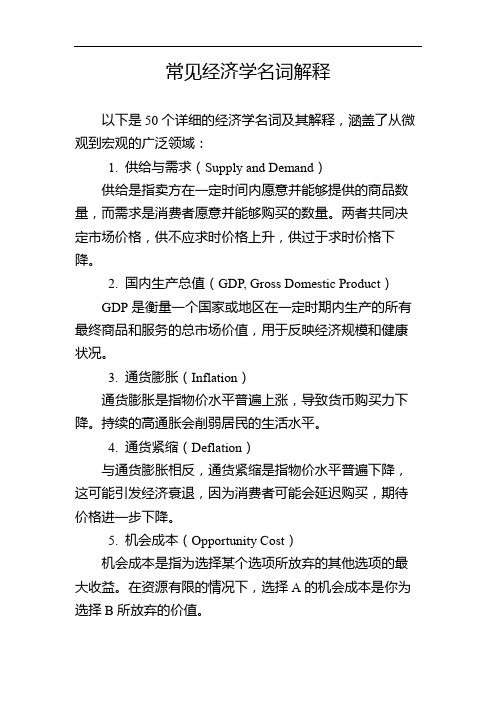西南民族大学 经济学基础 ch3 supply and demand
- 格式:ppt
- 大小:902.50 KB
- 文档页数:73



微观经济学英语大一知识点微观经济学是经济学的分支之一,研究个体经济单位(如家庭、企业等)的决策行为以及市场机制如何影响价格和资源分配。
在大一的学习中,了解和掌握微观经济学的基本概念和原理是非常重要的。
以下是关于微观经济学的一些英语知识点:1. Demand and Supply(需求与供给)需求与供给是微观经济学的基础概念之一。
需求是指消费者愿意购买某种商品或服务的数量。
供给是指生产者愿意提供给市场的某种商品或服务的数量。
需求和供给的交互决定了市场的价格和数量。
从经济学角度看,需求和供给是互相影响、相互制约的。
2. Elasticity(弹性)弹性是指价格变动对需求和供给的敏感程度。
需求弹性衡量消费者对价格变动的反应程度,而供给弹性衡量生产者对价格变动的反应程度。
需求弹性的计算方法是需求量的百分比变化除以价格的百分比变化。
供给弹性的计算方法是供给量的百分比变化除以价格的百分比变化。
弹性的数值越大,表示对价格变动的反应越敏感。
3. Consumer Behavior(消费者行为)消费者行为研究消费者在购买商品或服务时的决策过程和行为。
消费者行为受到多种因素的影响,包括个人偏好、收入水平、价格水平、市场环境等。
了解消费者行为对于企业制定市场营销策略至关重要,能够更好地满足消费者需求和提高市场份额。
4. Producer Behavior(生产者行为)生产者行为研究企业在生产和经营过程中的决策行为和策略选择。
生产者行为受到成本、技术水平、市场需求等因素的影响。
了解生产者行为能够帮助企业优化生产过程、制定合理的定价策略和扩大市场份额。
5. Market Structure(市场结构)市场结构研究市场中企业的数量、产品差异程度以及市场进入和退出的障碍程度。
常见的市场结构包括完全竞争市场、垄断市场、寡头垄断市场和垄断竞争市场。
不同的市场结构对于价格、利润和资源配置都有不同的影响。
了解不同市场结构的特点和影响有助于分析市场行为和预测市场走势。

常见经济学名词解释以下是50个详细的经济学名词及其解释,涵盖了从微观到宏观的广泛领域:1. 供给与需求(Supply and Demand)供给是指卖方在一定时间内愿意并能够提供的商品数量,而需求是消费者愿意并能够购买的数量。
两者共同决定市场价格,供不应求时价格上升,供过于求时价格下降。
2. 国内生产总值(GDP, Gross Domestic Product)GDP是衡量一个国家或地区在一定时期内生产的所有最终商品和服务的总市场价值,用于反映经济规模和健康状况。
3. 通货膨胀(Inflation)通货膨胀是指物价水平普遍上涨,导致货币购买力下降。
持续的高通胀会削弱居民的生活水平。
4. 通货紧缩(Deflation)与通货膨胀相反,通货紧缩是指物价水平普遍下降,这可能引发经济衰退,因为消费者可能会延迟购买,期待价格进一步下降。
5. 机会成本(Opportunity Cost)机会成本是指为选择某个选项所放弃的其他选项的最大收益。
在资源有限的情况下,选择A的机会成本是你为选择B所放弃的价值。
6. 边际效用(Marginal Utility)指消费者增加一单位商品或服务时获得的额外效用。
通常,随着消费的增加,边际效用会递减。
7. 边际收益(Marginal Revenue)边际收益是指企业销售每增加一单位产品所获得的额外收入。
在完全竞争市场中,边际收益等于价格。
8. 边际成本(Marginal Cost)指企业生产每增加一单位商品或服务所增加的成本。
边际成本通常随产量增加而上升。
9. 需求弹性(Price Elasticity of Demand)衡量消费者对商品价格变动的敏感程度。
如果需求对价格变动非常敏感,需求弹性较大;如果变化不大,则需求弹性较小。
10. 供给弹性(Price Elasticity of Supply)衡量供给量对价格变动的反应程度。
供给弹性较大意味着生产者能够迅速调整产量。
11. 比较优势(Comparative Advantage)即使一个国家在生产所有商品上的效率都不如其他国家,它也应该专注于生产相对成本较低的商品,这样能实现全球资源的更优配置。


传播政治经济学常用学术用语中英文1.供给和需求(Supply and Demand)- The principle of supply and demand determines the equilibrium price of a good or service.-供给与需求的原理决定了商品或服务的均衡价格。
2.边际效应(Marginal Effect)- Marginal effect refers to the change in the outcome resulting from a one-unit change in an independent variable.-边际效应是指独立变量的一单位变化所引起的结果变化。
3.地租(Rent)- Rent is the payment made to the owner of a property or resource for its use.-地租是用于租赁房地产或资源的产权所有人的支付。
4.货币供应(Money Supply)- Money supply refers to the total amount of money in circulation within an economy.-货币供应指的是经济体内流通的总货币数量。
5.资本积累(Capital Accumulation)- Capital accumulation refers to the growth of a nation's stock of capital goods, such as factories, machinery, and infrastructure.-资本积累指的是一个国家资本货物库存的增长,如工厂、机械和基础设施等。
6.社会福利(Social Welfare)- Social welfare refers to the well-being and quality of life of individuals within a society.-社会福利指的是一个社会中个体的福祉和生活质量。
我最喜欢的,经济学基础老四英文作文My Favorite Economics Basics: Supply and DemandEconomics basics are the foundation of understanding how the economy works and influences our daily lives. Among the many principles of economics, one of my favorite topics is the concept of supply and demand. It is a simple yet powerful idea that governs the market and determines prices of goods and services.Supply refers to the amount of a product that producers are willing to sell at a given price, while demand represents the quantity of a product that consumers are willing to buy at a given price. The interaction between supply and demand shapes the equilibrium price, where the quantity supplied equals the quantity demanded. This equilibrium price is where the market is in balance, and it reflects the true value of the product.One of the reasons I find the supply and demand concept fascinating is its real-world applications. For instance, when there is high demand for a product but limited supply, the price tends to go up. On the other hand, if the supply exceeds demand, prices will fall. This simple rule explains why certain products become expensive during shortages, such as during a naturaldisaster or a pandemic, and why prices drop during sales events or when a new competitor enters the market.Another reason I enjoy studying supply and demand is its role in decision-making. As a consumer, understanding the relationship between supply and demand can help me make informed choices about my purchases. For example, if a product is in high demand, I may choose to buy it now before the price goes up. Conversely, if a product is abundant, I might wait for a sale or look for alternatives that offer better value.From a producer's perspective, knowing how supply and demand affect prices can help in setting pricing strategies and production levels. By anticipating changes in consumer behavior, businesses can adjust their supply to meet demand and maximize profits. This knowledge is crucial for businesses to stay competitive and thrive in the market.In conclusion, the concept of supply and demand is a fundamental principle of economics that influences all aspects of our economy. Its simplicity and practicality make it a favorite topic among economists and students alike. By mastering the dynamics of supply and demand, we can gain valuable insights into market trends, make informed decisions, and understand the forces that shape our economy. So next time you see a pricetag or a sale sign, remember that behind it lies the powerful interplay of supply and demand.。
经济学基础心得体会英文As a student studying economics, I have come to realize that economics is not just about numbers and graphs, but an understanding of human behavior and decision-making. Through my studies, I have gained a deeper understanding of the principles that govern the economy and how they affect the world around us.One of the most important concepts in economics is supply and demand. This basic principle explains how prices are determined in markets. When demand for a product or service is high and supply is low, prices will go up. Conversely, when supply is high and demand is low, prices will go down. This concept can be applied to many different markets, from the stock market to the labor market.Another important concept in economics is opportunity cost. This principle states that when we make a decision to pursue one course of action, we must give up the opportunity to pursue other options. For example, if I choose to attend college, I am giving up the opportunity to work full-time and earn money immediately. Understanding opportunity cost helps us make more informed decisions by weighing the benefits and drawbacks of each course of action.The role of government in the economy is also an important topic in economics. Economists debate the merits of government intervention in markets, with some arguing that it can lead to inefficiency and higher prices, while others argue that it can promote fairness and protect consumers. Understanding the role of government in the economy is important for evaluating economic policies and proposals.In addition to these concepts, economics has exposed me to a variety of analytical tools and methods, including regression analysis, game theory, and cost-benefit analysis. These tools help us to better understand economic behavior and to make informed decisions in our personal and professional lives.Overall, my studies in economics have given me a greater appreciation for the complexity of the global economy and the ways in which it affects our daily lives. Economics provides a framework for understanding why things happen the way they do, and it is an important field for anyone interested in making informed decisions and contributing to the betterment of society.。